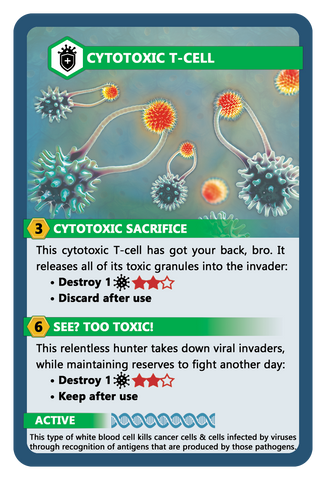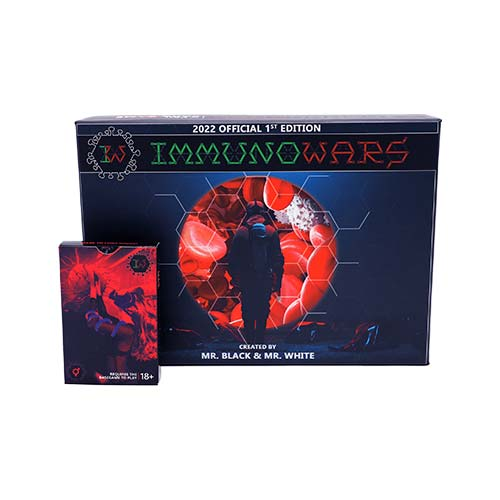Welcome, fellow ImmunoWarriors! Today, we're diving into the world of cytotoxic T cells – the silent assassins of your immune system that you never knew you needed. With a dash of dark humor and a sprinkle of intriguing information, join us as we explore the fascinating world of these deadly immune cells. Will you join Mr. White in his mission to protect the body, or will you side with Mr. Black and his army of infectious agents? The choice is yours!
Did you know that cytotoxic T cells are the body's primary defense against cancer cells? Or that they play a crucial role in controlling viral infections? Strap in, and let's explore the fascinating world of cytotoxic T cells and their role in ImmunoWars.
Top 5 Intriguing Facts About Cytotoxic T Cells – From Cancer to Viral Infections
Prepare for a journey into the world of cytotoxic T cells as we unveil some lesser-known facts that will leave you amazed (and perhaps slightly horrified). Here are the top 5 intriguing facts about cytotoxic T cells, perfectly designed to fuel your mission as an ImmunoWarrior.
1. Cytotoxic T Cells: The Body's Anti-Cancer Soldiers
Cytotoxic T cells are the body's primary defense against cancer cells. They are capable of recognizing and eliminating cells that have become cancerous, preventing the spread of the disease. This makes them a crucial component of the body's immune response and a valuable asset in the fight against cancer.
2. Cytotoxic T Cells and Viral Infections
Cytotoxic T cells play a crucial role in controlling viral infections. They do this by recognizing and eliminating cells that have been infected by viruses, preventing the virus from spreading and causing further damage. This makes them a key player in the body's defense against viral diseases like influenza, HIV, and many others.
3. The Role of Cytotoxic T Cells in Autoimmune Diseases
While cytotoxic T cells are essential for protecting the body against infections and cancer, they can also contribute to the development of autoimmune diseases when they malfunction. In conditions like multiple sclerosis and type 1 diabetes, cytotoxic T cells mistakenly attack the body's own cells, leading to tissue damage and disease.
4. The Lifespan of Cytotoxic T Cells
Cytotoxic T cells have a relatively short lifespan in the body. They are produced in response to an infection and rapidly multiply to fight off the invading pathogen. Once the infection has been cleared, most of the cytotoxic T cells die off, while a small number remain as memory cells, ready to respond quickly if the same pathogen is encountered again.
5. Cytotoxic T Cells in Organ Transplants
Cytotoxic T cells play a significant role in organ transplants. They are responsible for the rejection of transplanted organs, as they recognize the cells of the transplanted organ as foreign and attack them. This is why transplant recipients must take immunosuppressive drugs to prevent organ rejection.
Cytotoxic T Cells – The Silent Assassins of the immune system
Cytotoxic T cells, also known as killer T cells, are one of the most potent weapons in the body's arsenal against infections and diseases. These silent assassins are often unnoticed but play a crucial role in maintaining our health.
The Silent Killers
Cytotoxic T cells are often referred to as the immune system's silent killers. They quietly patrol the body, searching for cells that have been infected by viruses or transformed into cancer cells. Once they find their target, they launch a deadly attack, releasing toxins that cause the target cell to self-destruct.
The Power of the Cytotoxic T Cell
The power of the cytotoxic T cell lies in its ability to recognize and eliminate infected or cancerous cells. This is made possible by a complex process known as antigen presentation, where fragments of proteins from the target cell are displayed on its surface. The cytotoxic T cell recognizes these fragments and binds to the target cell, triggering the release of toxins that cause the target cell to self-destruct.
Cytotoxic T Cells: The Unsung Heroes of Mr. White
In the thrilling universe of ImmunoWars, the cytotoxic T cell card is a powerful ally that can turn the tide of the game. As a defense card, it stands as a formidable guardian against the onslaught of infections and diseases, representing the forces of good led by Mr. White.

Mr. White's Defense Strategies: Harnessing the Power of the Cytotoxic T Cell
Step into the shoes of Mr. White, the beacon of health and well-being, as we unveil his strategic use of the cytotoxic T cell card. With its ability to eliminate opponent's cards that represent infections or diseases, the Cytotoxic T Cell card is a force to be reckoned with.
First, let's talk about the Cytotoxic Sacrifice: a selfless move that only costs 3 ATP (energy). When Mr. White activates this ability, the cytotoxic T cell releases all of its toxic granules into the invader, destroying a virus with 2-star severity. However, this noble sacrifice means the card is discarded after use. Imagine the relief as you watch a threatening virus card removed from the game, all thanks to the selfless act of your cytotoxic T cell.
But wait, there's more! If you're in the mood for a more sustainable defense, gather 6 ATP and activate the "See? Too toxic!" ability. This relentless warrior hunts down viral invaders, while keeping plenty reserves to fight another day. It destroys a virus with 2-star severity but, unlike the Cytotoxic Sacrifice, the card remains in play after use. Talk about a sustainable defense strategy!
Join Mr. White and his cytotoxic T cell-infused army as you strategize, defend, and ward off diseases across the game board. Your opponents won't know what hit them until it's too late. And remember, in the twisted world of ImmunoWars, there's no room for mercy.
Mr. Black's Battle Tactics: Outmaneuvering the Cytotoxic T Cell
As the embodiment of evil, Mr. Black represents the viruses and bacteria that the cytotoxic T cell card is designed to combat. While the cytotoxic T cell card poses a significant threat to his viral forces, Mr. Black has a few tricks up his sleeve to outmaneuver this formidable defence.
Firstly, it's important to note that cytotoxic T cells are specialized in combating viral infections. This means they can only defend against attacks by virus cards. They are powerless against bacterial attacks with bacteria cards. This gives Mr. Black a strategic advantage when he plays bacteria cards, as they can bypass the cytotoxic T cell's defence and strike directly at the opponent.
Secondly, Mr. Black must always keep an eye on his opponent's energy level. Activating the cytotoxic T cell card requires ATP (energy). If his opponent does not have enough ATP (3 ATP), they won't be able to activate the cytotoxic T cell card. This can provide Mr. Black with a strategic opening to launch an attack when his opponent's energy reserves are low, ensuring his viral or bacterial onslaught goes unchallenged.
By carefully considering these tactics, Mr. Black can strategize effectively against the cytotoxic T cell card, turning the tide of the game in his favor. But he must always be wary, for the forces of Mr. White are ever vigilant, ready to defend against his attacks and protect the body from his infectious onslaught.
The Role of Cytotoxic T Cells in the Immune System
Cytotoxic T cells play a crucial role in the immune system. They are responsible for recognizing and eliminating cells that have been infected by viruses or transformed into cancer cells.
This makes them a key player in the body's defence against diseases. They are particularly effective against viral infections and cancer cells, recognizing and binding to these transformed cells and releasing toxins that cause the cell to self-destruct.
The Lifespan and Regeneration of Cytotoxic T Cells
Cytotoxic T cells have a relatively short lifespan in the body. They are produced in response to an infection and rapidly multiply to fight off the invading pathogen. Once the infection has been cleared, most of the cytotoxic T cells die off, while a small number remain as memory cells, ready to respond quickly if the same pathogen is encountered again.
FAQ
What are cytotoxic T cells?
Cytotoxic T cells, also known as killer T cells, are a type of white blood cell that plays a crucial role in the immune system's response to infections and diseases. They work by recognizing and binding to infected cells or cancer cells, releasing toxins that cause the target cell to self-destruct.
How do cytotoxic T cells recognize infected or cancerous cells?
Cytotoxic T cells recognize infected or cancerous cells through a process known as antigen presentation. Fragments of proteins from the target cell are displayed on its surface, and the cytotoxic T cell recognizes these fragments and binds to the target cell.
What role do cytotoxic T cells play in the immune system?
Cytotoxic T cells play a crucial role in the immune system. They are responsible for recognizing and eliminating cells that have been infected by viruses or transformed into cancer cells. This makes them a key player in the body's defence against diseases.
How long do cytotoxic T cells last?
Cytotoxic T cells have a relatively short lifespan in the body. They rapidly multiply during an infection, and once the infection is cleared, most of them die off. However, a small number remain as memory cells, ready to respond quickly to future infections.
Why are cytotoxic T cells called serial killers?
Cytotoxic T cells are often referred to as "serial killers" because of their ability to kill multiple target cells one after the other. They do this by releasing toxins that cause the target cell to self-destruct, then moving on to the next infected or cancerous cell.
How are cytotoxic T cells activated?
Cytotoxic T cells are activated when they encounter a cell presenting a specific antigen that matches their T cell receptor. This usually happens when the body is fighting off an infection or disease.
How do cytotoxic T cells work in ImmunoWars?
In ImmunoWars, the cytotoxic T-cell card is a defence card that can eliminate opponent's cards representing infections or diseases. It has two abilities: "Cytotoxic Sacrifice" and "See? Too toxic!". Both abilities require ATP to activate and can destroy a virus card with 2-star severity. The difference is that "Cytotoxic Sacrifice" discards the card after use, while "See? Too toxic!" keeps the card in play after use.
Conclusion
Cytotoxic T cells, the microscopic "serial killers" of our immune system, are the unsung heroes in the thrilling game of ImmunoWars. These silent warriors, always on guard, are the body's first line of defense against viral invaders and even cancer cells. Their ability to remember past invaders and respond more quickly to future threats is a testament to their critical role in our immune system.
In the ImmunoWars universe, the cytotoxic T cell card is a powerful defense tool. With their toxic granules, they can annihilate viral invaders, demonstrating that even the smallest defenders can pack a powerful punch. But remember, these cells are not invincible. They require ATP to activate their abilities, and they can't defend against bacterial attacks. This adds an extra layer of strategy to the game, as players must carefully manage their resources and anticipate their opponents' moves.
One of the most fascinating aspects of cytotoxic T cells is their role in fighting cancer. These cells can recognize and destroy cancer cells, making them a crucial component of the body's natural defense against this disease. This is reflected in ImmunoWars, where the cytotoxic T cell card can be a game-changer in battles against high-severity viruses.
As you delve deeper into the world of ImmunoWars, remember to keep your eyes open and your guard up. The game is a constant reminder of the real-world battles our immune system fights every day. So, whether you're strategizing your next move in the game or simply going about your day, remember the power of the cytotoxic T cell. These microscopic warriors are always on guard, ready to protect us from the unseen threats that lurk in the shadows.
Now, gear up and join the battle to crush invaders once and for all! In the treacherous realm of ImmunoWars, every card counts, and the cytotoxic T cell card might just be the ace up your sleeve.


